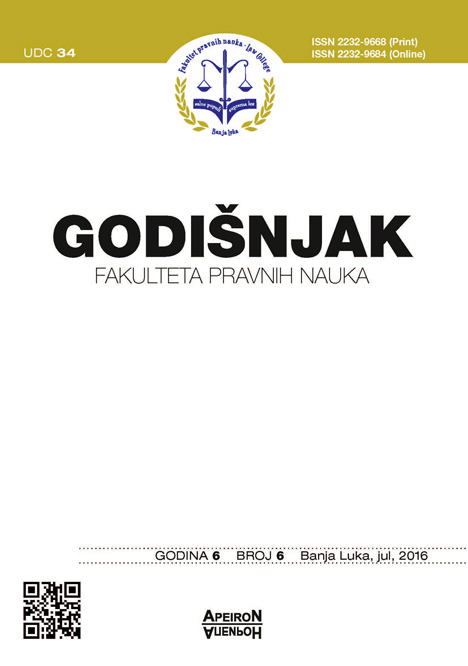Ustavni sud Bosne i Hercegovine - od ustavobranitelјa do ustavotvorca / Constitutional Court of Bosnia and Herzegovina
DOI:
https://doi.org/10.7251/GFP1606104KAbstract
The most important issue of the functioning and survival of the states of ambiguous complex federal type (such as BiH), has been the issue of division of competences, and in this regard, the issue of constitutional efficient control of these federal relationships and the distribution of competences.
Belonging to a particular collectivity acts as a defining category in the views of the political and constitutional arrangement of Bosnia and Herzegovina as a state community. By bringing the connection of everything with the constitutional model, by creating an image of intolerance of socio-political situation in its own terms, by declaring it guilty of all the crises in Bosnia and Herzegovina, someone wants to create an uncontested application for its change, or replace it by a new constitutional model. The priority goal is to create the perception that the Dayton constitution is an interim solution, which has exhausted its capacities for further development of the state and legal framework. However, substantial amendments to the Constitution appeared de facto by the process of constitutional revision without changing a single letter of the Constitution.
The Constitutional Court of BiH found itself in the role of an institution that would confirm and implement its “final and binding” decisions, whose non-implementation would be sanctioned.
The Constitutional Court is a special state body whose primary function is to control the constitutionality and legality of legal acts according to a specific procedure. According to this principle, in addition to the Constitutional Court of BiH, there are constitutional courts of federal units (entities).
However, by the role from the defenders of constitution to the constitution makers, the BiH Constitutional Court gave itself the right not only to preserve the Constitution, but also to change it through interpreting it (according to its Rules). The revision of constitutional norms through the Constitutional Court has been performed in several ways: first of all, through linguistic interpretation, the general interpretation of norms, as well as the interpretation of certain legal-political milieu of the BiH Federation and with the help of the international factors. The constitutional definition of the position and role of the BiH Constitutional Court has been erroneously and tendentiously interpreted, giving it the ability to significantly change the constitutional position of the entity in relation to BiH. At the same time, it allowed itself an action that was and has been completely out of range and control of the entities that make up the substantial figure of Bosnia and Herzegovina. In this sense, the main institution for the protection of the Constitution of Bosnia and Herzegovina followed the path of its original decommissioning and creation of constitutional framework for a new state of Bosnia and Herzegovina by its own decisions, going into assessments of political and discretionary nature of the state bodies’ decisions and expediency of those decisions.
Due to the practices adopted, in neither of its segment, the Constitutional Court has been under social control of any institutional authorities at any level. By its free action, it becomes the main advantage in the hands of all those who advocate new constitutional realities which are the opposite of the Dayton Constitution of BiH. Contrary to the continental law school of centralized judicial control of constitutionality and strict implementation of the constitution and constitutional procedures, the Constitutional Court acts as the US Supreme Court.
On the basis of already established rules, the BiH Constitutional Court rather than it only makes application to individual cases (the European law), on the contrary, on the basis of individual cases it determines the rules (precedent Anglo Saxon law). That is why all serious attempts would question the action of unconstitutional institutions at the state level, for the final authority of the Constitutional Court of BiH and its current practices are doomed to failure in advance.
The current rules on the one hand and the court practice on which the Constitutional Court operates on the other hand, explicit show the tendency of transformation of a complex federal state structure with elements of confederal type, according to a unitary, in the form of constitutional protection.
Transfer of competencies from the entities to the state, confirmed by the BiH Constitutional Court, which was carried out in the post Dayton period with the use of methods that are deeply in conflict with democratic principles, significantly reduced the confederal items of BiH arrangement, in favor of strengthening capacities of the state institutions and federal state.
